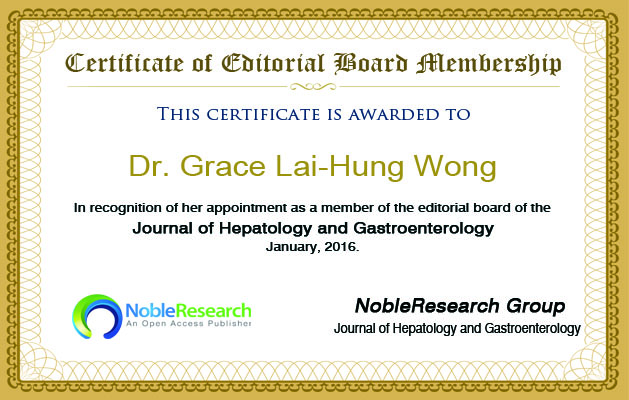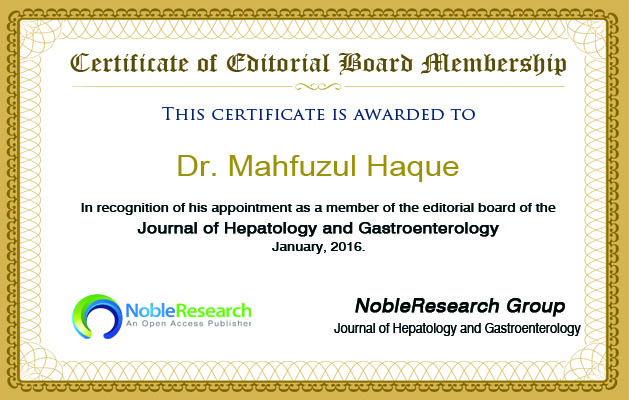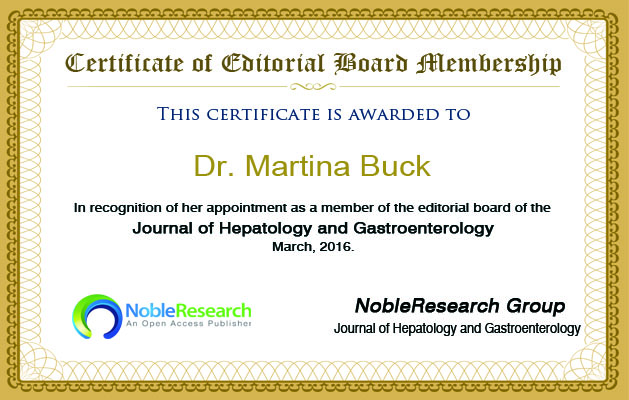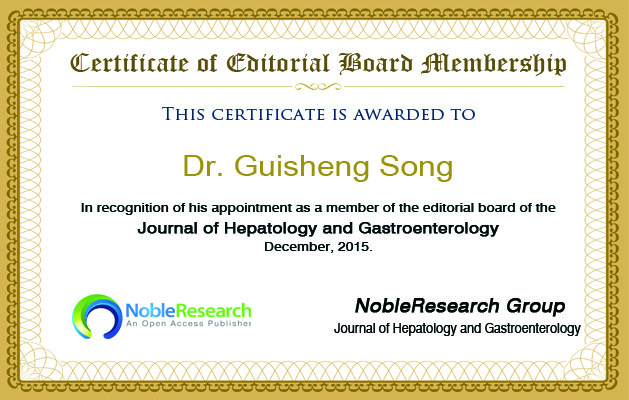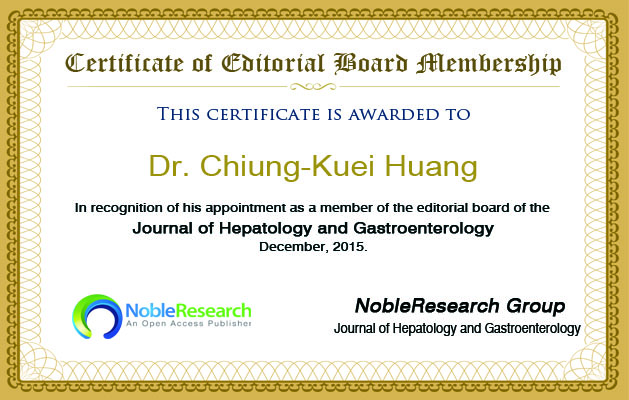
The email alerts service allows anyone who registers their email address to be notified via email when new content goes online.
Recommend this journal to your friend or library.
Manuscripts should be submitted online through our website or as an email attachment to the editorial office at editor.jhg@nobleresearch.org

- Dr. Randa M.Mostafa,
- Professor of Clinical physiology,
- Chairman of Basic Medical Sciences,
- President of Emirates Menopause Society UAE,
- College of Medicine,
- Sharjah University, UAE.
- BiographyOpen or Close
Dr. Randa M.Mostafa is a professor of Clinical physiology and Chairman of Basic Medical Sciences Department, Quality assurance, and program evaluation Committee from College of Medicine Sharjah University, UAE. She graduated with MBBS from the College of Medicine, Benha University. Egypt (1985). She got her M.Sc. (General human Physiology) College of Medicine, Benha University. Egypt (1989). She earned her Ph.D, in Clinical Physiology from the College of Medicine, Benha University Egypt (1992). Dr. Randa M.Mostafa did two fellowships one in Department of Physiology, Ohio State University, Columbus, Ohio USA (1997- 1998). Department of Surgery labs, University of Pittsburgh, Pennsylvania USA (2000-2001). She was honored with many awards. She has published over 68 research papers.
- ExpertiseOpen or Close
Dr. Randa M.Mostafa research interest includes aging, Electromagnetic fileds and biology , hormones , women health , Menopause , Medical education , antioxidants, complimentary medicine, Gastrointestinal motility.
- CertificateOpen or Close
- PublicationsOpen or Close

- Dr. Grace Lai-Hung Wong,
- Professor,
- Department of Medicine & Therapeutics,
- Prince of Wales Hospital,
- 30-32 Ngan Shing Street,
- Shatin, New Territories,
- Hong Kong, China.
- BiographyOpen or Close
Grace Wong is the Professor of The Chinese University of Hong Kong. She graduated from the Chinese University of Hong Kong in 2001 with honors and distinctions in Medicine. After graduation, she received training at the division of Gastroenterology and Hepatology at the Prince of Wales Hospital. In 2008, she completed her training and was awarded Fellow of the Hong Kong College of Physicians. In 2010, she received the Doctorial Degree of Medicine of the Chinese University of Hong Kong. She has been awarded for the Young Investigator Award of the Asian Pacific Association for the Study of the Liver in 2009, the Distinguished Research Paper Award for Young Investigators of the Hong Kong College of Physicians in 2010, 2013, 2014 and 2015, and the Ten Outstanding Young Persons (TOYP) of Hong Kong in 2014. She has published over 160 articles in peer-reviewed journals.
- ExpertiseOpen or Close
Grace Wong’s main research interest includes chronic hepatitis B and C, non-invasive assessment of liver fibrosis, and hepatocelluar carcinoma.
- CertificateOpen or Close
- PublicationsOpen or Close
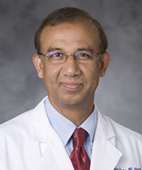
- Dr. Mahfuzul Haque,
- Associate Professor,
- Department of medicine,
- Director of Endoscopy, DVAMC,
- Division of Gastroenterology,
- Duke University,
- USA,
- BiographyOpen or Close
Dr. Mahfuzul Haque is currently an Associate Professor of Medicine from Duke University. He received his M.B.B.S degree from the Dhaka Medical College, Bangladesh (1975-1982). He then completed his FRACP from Royal Australasian College of Physicians (1996). He was one of the first Gastroenterologists in the mid-Atlantic region of USA to adopt Endoscopic Submucosal Dissection (ESD). A significant volume of his work includes resection of very large, defiant polyps and early cancers deemed unresectable by other endoscopists and surgeons. He is also chair of regular literature review sessions and case conferences.
- ExpertiseOpen or Close
Dr. Mahfuzul Haque main clinical and research interest is in advanced endoscopic procedures. These include Endoscopic Retrograde Cholangio Pancreatography (ERCP), Cholangioscopy, Endoscopic Ultrasonography (EUS), Pancreato-Biliary Endoscopy, Endoscopy Training, Quality Improvement (QI) in endoscopy.
- CertificateOpen or Close
- PublicationsOpen or Close

- Dr. Martina Buck,
- Associate professor of Medicine,
- Division of Gastroenterology,
- University of California San Diego,
- 9500 Gilman Drive,
- La Jolla, CA 92093,
- USA.
- BiographyOpen or Close
Dr. Martina Buck is an Associate Adjunct Professor of Medicine, UCSD. Dr. Buck graduated with B.A. in Microbiology in 1987 and she obtained her PhD in 1996 from the University of California, San Diego. Dr. Buck previously held positions include Assistant Adjunct Professor of Medicine, UCSD (2003-2010), Faculty Member, Biomedical Sciences Program (2003-2005), Research Scientist, UCSD (2000-2002) and Postdoctoral Research Fellow (1997-2000). Dr. Buck received many awards i.e. Student Research Fellowship Award, American Gastroenterological Association in 1988; Student Research Fellowship Award, American Liver Foundation in 1988; Predoctoral Fellowship Award, University of Geneva in 1990 and etc. She has published more than 26 articles in peer-reviewed journals and she has many patents.
- ExpertiseOpen or Close
Dr. Martina Buck’s research is focused on hepatitus C and the signal transuction pathways leading to hepatocellular carcinomas.
- CertificateOpen or Close
- PublicationsOpen or Close

- Dr. Guisheng Song,
- Assistant Professor,
- Division of Gastroenterology,Hepatology & Nutrition,
- Department of Medicine,
- Department of Genetics,Cell Biology & Development,,
- University of Minnesota,
- Minneapolis, MN 55455, USA.
- BiographyOpen or Close
Dr. Guisheng Song is as an Assistant Professor at the University of Minnesota with extensive training in the basic sciences and translational medicine from three outstanding medical institutions (University of California, San Francisco (UCSF), University of Utah and Mayo Clinic). He is well-suited to recognize challenging health problems and design scientifically sound studies that are hypothesis-driven and relevant to hepatic metabolic dysfunctions. For his Ph.D. dissertation, he performed genomics and transcriptomics research. Dr. Guisheng Song postdoctoral training at the Mayo Clinic was focused on pharmacogenomics. As a result of that training, he was able to identify drug metabolism and response problems specific to human diseases; tailor experimental designs to address those problems at the cellular and molecular level; and assess relevancy to the clinical scenario: a ‘bedside-to-bench-to-bedside’ perspective that is a key driving force in modern day translational medicine. His postdoctoral training at the UCSF and University of Utah allowed him to gain a strong mechanistic and translational perspective in the field of hepatic metabolic diseases. He joined the faculty in the Department of Medicine at the University of Minnesota in July, 2012. Since that time, he established a productive research program, which mainly focuses on the regulatory roles of miRNA in the progression NAFLD to HCC as well as the progression of NAFLD to NASH (non-alcoholic steatohepatitis).
- ExpertiseOpen or Close
Dr. Guisheng Song is a basic and translational research scientist with a strong commitment to investigate the roles of microRNAs in non-alcoholic fatty liver (NAFLD), insulin resistance, liver cancer and dyslipidemia, and develop microRNAs as new therapeutic approaches for these disorders. Specifically Dr. Guisheng Song will use molecular and cellular approaches, bioinformatics and genomic tools, mouse models and human specimens to elucidate the underlying mechanism of the pathogenesis of NAFLD and hepatocellular carcinoma (HCC) as well as the progression of simple steatosis to liver damage. His ultimate goal is to develop unique and novel therapeutic and diagnostic approaches for human liver diseases.
- CertificateOpen or Close
- PublicationsOpen or Close
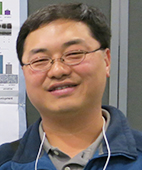
- Dr. Chiung-Kuei Huang,
- Assistant Professor,
- Department of Medicine,
- Warren Alpert Medical School,
- Brown University and Rhode Island Hospital,
- 593 Eddy St., Providence, RI 02903,
- USA.
- BiographyOpen or Close
Dr. Huang is currently an assistant professor at the Brown University. He received his Ph.D. degree from the University of Rochester, New York, working on androgen receptor in stem cell application in liver diseases. He then completed his post-doctoral training in gender difference of cardiovascular diseases with specific focus of deciphering the role of androgen receptor in cardiovascular diseases using cell specific knock out mouse model via Cre-LoxP strategy. He expanded his post-doctoral training to the liver and its associated diseases, including alcoholic liver diseases, nonalcoholic steatosis, hepatocellular carcinoma, and cholangiocarcinoma in the Liver Research Center at Brown University. He identified that the insulin-induced aspartate beta-hydroxylase is a critical mediator in tumor cellular senescence.
- ExpertiseOpen or Close
Dr. Huang’s research interests mainly focus on aspartate β-hydroxylase (ASPH) in cancer malignant progression. He completed studies suggest that knockdown of ASPH affects the malignant phenotype by reducing tumor cell proliferation, migration, invasion, metastasis and colony formation in soft agar in the three aforementioned types of tumors. A potential molecular mechanism for ASPH transforming activity has been revealed since knockdown of ASPH inhibits Notch1 transcriptional activity as well as that ASPH involves in tumor cellular senescence through GSK3β-mediated p16 molecular signaling. Dr. Huang findings suggest that ASPH may either serve as a bridge to help their interaction or exert its enzymatic function to affect the affinity of protein interaction. Dr. Huang ongoing project also has similar finding that ASPH has an impact on regulating the phosphorylation of retinoblastoma (RB1) protein by affecting its binding ability to cyclin-dependent kinases. My completed studies suggest that ASPH may be a potential therapeutic target in CCA, HCC and PC.
- CertificateOpen or Close
- PublicationsOpen or Close





